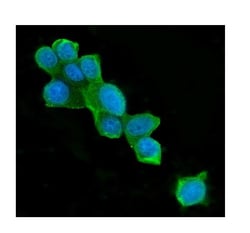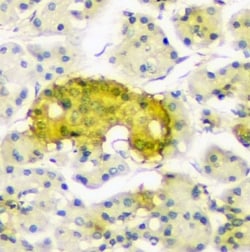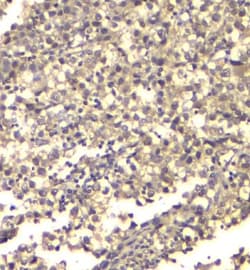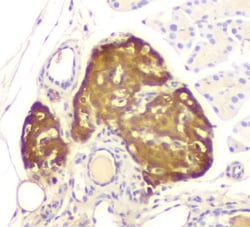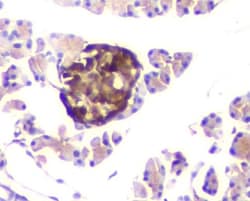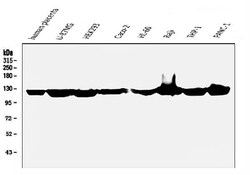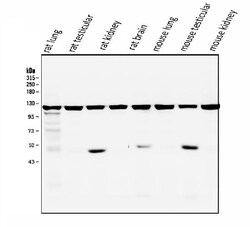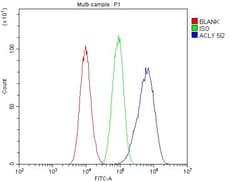Learn More
Invitrogen™ ATP Citrate Lyase Monoclonal Antibody (5I2)
Mouse Monoclonal Antibody
Supplier: Invitrogen™ MA549221
Description
Adding 0.2 mL of distilled water will yield a concentration of 500 μg/mL. Human ATP citrate lyase shares 95% amino acid (aa) sequence identity with both mouse and rat ATP citrate lyase. Positive Control - WB: human placenta tissue, U-87MG whole cell, HEK293 whole cell, Caco-2 whole cell, HL-60 whole cell, Raji whole cell, THP-1 whole cell, PANC-1 whole cell, rat lung tissue, rat testicular tissue, rat kidney tissue, rat brain tissue, mouse lung tissue, mouse testicular tissue, mouse kidney tissue. IHC: human pancreatic cancer tissue, human testis cancer tissue, mouse pancreas tissue, rat pancreas tissue. ICC/IF: MCF7 cell. Flow: A549 cell. Store at -20°C for one year from date of receipt. After reconstitution, at 4°C for one month. It can also be aliquotted and stored frozen at -20°C for six months. Avoid repeated freeze-thaw cycles.
ATP citrate lyase is the primary enzyme responsible for the synthesis of cytosolic acetyl-CoA in many tissues. The enzyme is a tetramer (relative molecular weight approximately 440,000) of apparently identical subunits. It catalyzes the formation of acetyl-CoA and oxaloacetate from citrate and CoA with a concomitant hydrolysis of ATP to ADP and phosphate. The product, acetyl-CoA, serves several important biosynthetic pathways, including lipogenesis and cholesterogenesis. In nervous tissue, ATP citrate-lyase may be involved in the biosynthesis of acetylcholine. Two transcript variants encoding distinct isoforms have been identified for this gene.
Specifications
| ATP Citrate Lyase | |
| Monoclonal | |
| 500 μg/mL | |
| PBS with 4mg trehalose and 0.05mg sodium azide | |
| P16638, P53396, Q91V92 | |
| Acly | |
| E. coli-derived human ATP citrate lyase recombinant protein (Position: M1-I180). | |
| 100 μg | |
| Primary | |
| Human, Mouse, Rat | |
| Antibody | |
| IgG2b |
| Flow Cytometry, Immunohistochemistry (Paraffin), Western Blot, Immunocytochemistry | |
| 5I2 | |
| Unconjugated | |
| Acly | |
| 17-beta-HSD 10; 17-beta-hydroxysteroid dehydrogenase 10; 17bHSD10; 17b-HSD10; 2-methyl-3-hydroxybutyryl-CoA dehydrogenase; 3-hydroxy-2-methylbutyryl-CoA dehydrogenase; 3-hydroxyacyl-CoA dehydrogenase type II; 3-hydroxyacyl-CoA dehydrogenase type-2; A730098H14Rik; ABAD; AB-binding alcohol dehydrogenase; ACL; ACLY; Ads9; amyloid beta-peptide binding protein; amyloid-beta peptide binding alcohol dehydrogenase; ATP citrate lyase; ATP-citrate (pro-S-)-lyase; ATP-citrate synthase; ATPCL; AW538652; CAMR; citrate cleavage enzyme; CLATP; DUPXp11.22; endoplasmic reticulum-associated amyloid beta-peptide-binding protein; ERAB; HADH2; HCD2; Hsd17b10; hydroxyacyl-Coenzyme A dehydrogenase type II; hydroxyacyl-Coenzyme A dehydrogenase, type II; hydroxysteroid (17-beta) dehydrogenase 10; hydroxysteroid 17-beta dehydrogenase 10; hydroxysteroid dehydrogenase 10; MHBD; Mitochondrial ribonuclease P protein 2; mitochondrial RNase P protein 2; mitochondrial RNase P subunit 2; MRPP2; MRX17; MRX31; MRXS10; SCHAD; SDR5C1; short chain dehydrogenase/reductase family 5C member 1; short chain dehydrogenase/reductase family 5C, member 1; short chain L-3-hydroxyacyl-CoA dehydrogenase; short chain L-3-hydroxyacyl-CoA dehydrogenase type 2; short chain type dehydrogenase/reductase XH98G2; Short-chain type dehydrogenase/reductase XH98G2; Type II HADH; XH98G2 | |
| Mouse | |
| Antigen affinity chromatography | |
| RUO | |
| 104112, 24159, 47 | |
| -20°C | |
| Lyophilized |
Your input is important to us. Please complete this form to provide feedback related to the content on this product.
